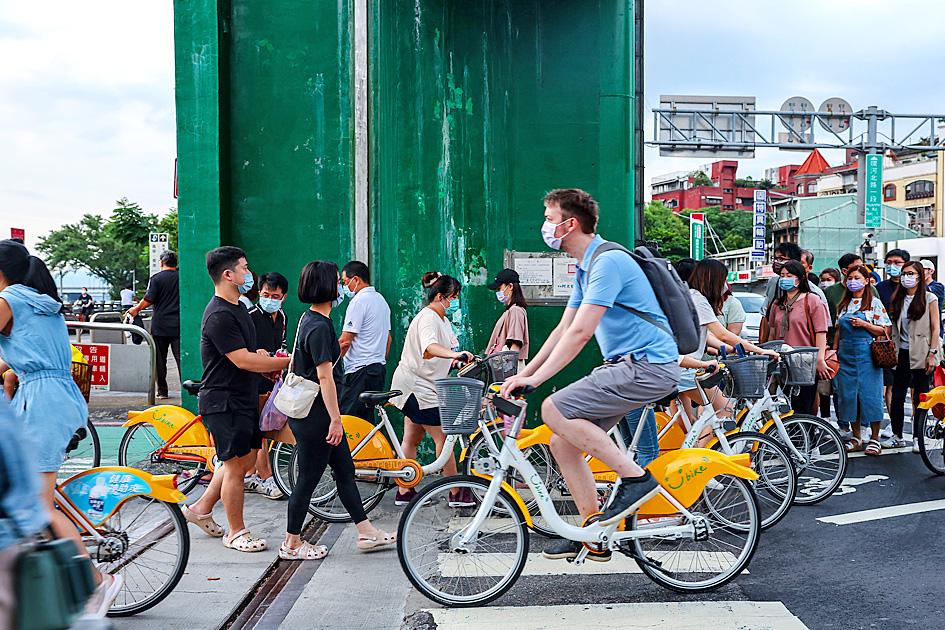Taipei has been named the 10th best city in the world for quality of living in an annual survey by the editors of Monocle, a UK-based global affairs and lifestyle magazine.
The survey, which is to be published in the magazine’s July/August issue, selected the world’s top 25 cities based on factors including cost of living, retail, hospitality, culture and access to green spaces, as well as feedback from Monocle correspondents.
Taipei’s 10th place finish was one place down from a year earlier.

Photo: CNA
The survey ranked Copenhagen as the world’s best city, with Zurich, Lisbon, Helsinki and Stockholm rounding out the top five.
Among Asian cities, only Tokyo finished above Taipei, placing sixth.
“Taipei is a subtropical oasis teeming with stunning hiking trails and walkable city streets,” the magazine said in an article introducing the city, which it described as a “hidden Asian gem.”
Taipei is known for its “tantalizing food stalls that are open 24 hours a day, with vendors slinging out bowls of cheap rice and noodles for early commuters or night owls,” it said.
The article lauded Taipei for its low crime rate and “world-class healthcare system,” as well as its convenient public transportation and cheap cost of living.
It also highlighted the way nature “nestles in” with Taipei’s urban environment, citing the gardens that many residents keep on their balconies and the city government’s practice of labeling trees with QR codes to help people identify them.
In terms of drawbacks, the article said Taipei needs to adopt a right of way for people crossing the street, saying that “despite improvements, it is still not always safe.”
The “antiquated banking system” in Taiwan also needs an upgrade, it said, with editors suggesting that banking services be made more easily accessible for residents and travelers.
Taiwan’s borders are still closed to tourists due to COVID-19 restrictions, but the government “has announced plans to slowly open up to visitors later this year,” the article said.

Chinese spouse and influencer Guan Guan’s (關關) residency permit has been revoked for repeatedly posting pro-China videos that threaten national security, the National Immigration Agency confirmed today. Guan Guan has said many controversial statements in her videos posted to Douyin (抖音), including “the red flag will soon be painted all over Taiwan” and “Taiwan is an inseparable part of China,” and expressing hope for expedited reunification. The agency last year received multiple reports alleging that Guan Guan had advocated for armed reunification. After verifying the reports, the agency last month issued a notice requiring her to appear and explain her actions. Guan

GIVE AND TAKE: Blood demand continues to rise each year, while fewer young donors are available due to the nation’s falling birthrate, a doctor said Blood donors can redeem points earned from donations to obtain limited edition Formosan black bear travel mugs, the Kaohsiung Blood Center said yesterday, as it announced a goal of stocking 20,000 units of blood prior to the Lunar New Year. The last month of the lunar year is National Blood Donation Month, when local centers seek to stockpile blood for use during the Lunar New Year holiday. The blood demand in southern Taiwan — including Tainan and Kaohsiung, as well as Chiayi, Pingtung, Penghu and Taitung counties — is about 2,000 units per day, the center said. The donation campaign aims to boost

The Kaohsiung Tourism Bureau audited six hotels in an effort to prevent price gouging ahead of Korean band BTS’ concert tour in the city scheduled for Nov. 19, 21 and 22 this year. The bureau on Friday said that the audits — conducted in response to allegations of unfair pricing posted on social media — found no wrongdoing. These establishments included the local branches of Chateau de Chine, Hotel Nikko, My Humble House, and Grand Hai Lai, it said, adding that the Consumer Protection Commission would have penalized price gougers had the accusations been substantiated. The bureau said the Tourism Development Act

The military yesterday said it has located the flight data recorder, or black box, of an F-16V jet that disappeared off eastern Taiwan earlier this month, and it would soon deploy a salvage team to try to retrieve it. Air Force Command Headquarters said that while it had pinned down the location of the black box, it was still searching for the aircraft’s sole pilot, air force Captain Hsin Po-yi (辛柏毅). Without providing details, the air force said it had located the black box days after detecting some intermittent signals and would now engage a team of professionals to retrieve it. The air